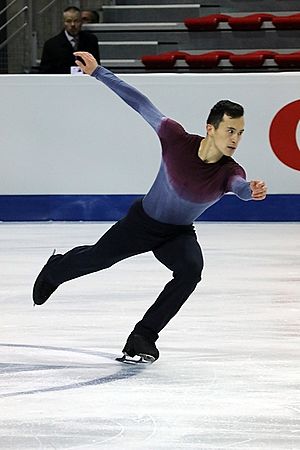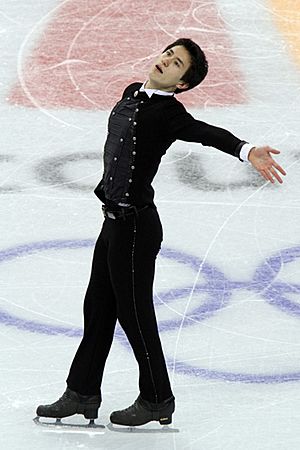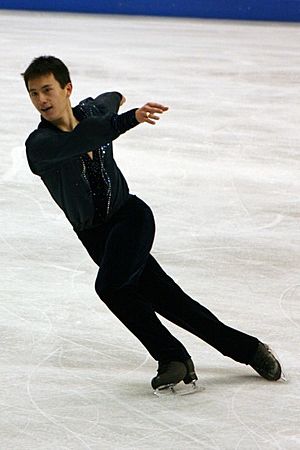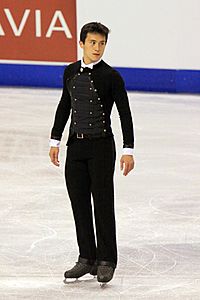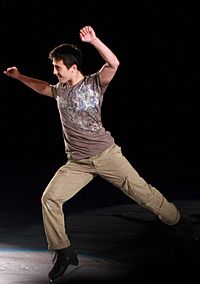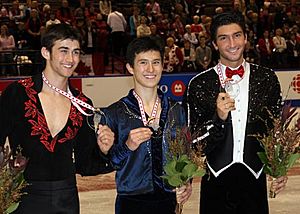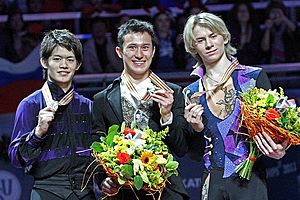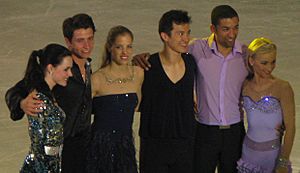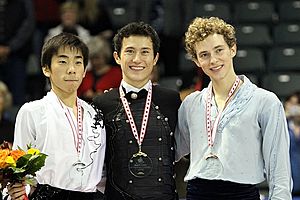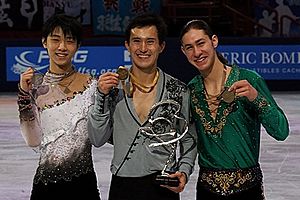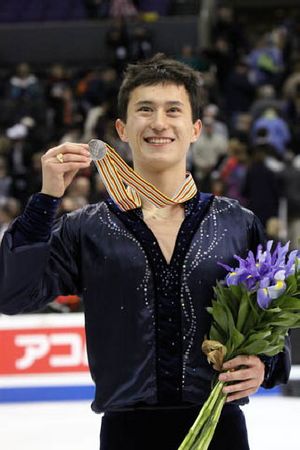Patrick Chan facts for kids
Quick facts for kids Patrick Chan |
|
|---|---|
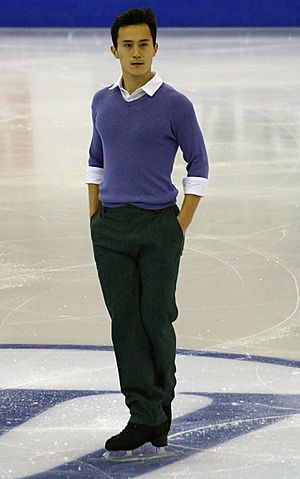
Patrick Chan at the 2015 Grand Prix Final
|
|
| Personal information | |
| Full name | Patrick Lewis Wai-Kuan Chan |
| Alternative names | Chan Wai-Kuan |
| Country represented | |
| Born | December 31, 1990 Ottawa, Ontario, Canada |
| Home town | Vancouver, British Columbia |
| Height | 1.71 m (5 ft 7+1⁄2 in) |
| Began skating | 1996 |
| Retired | April 16, 2018 |
| Patrick Chan | |||||||||||||
|---|---|---|---|---|---|---|---|---|---|---|---|---|---|
| Traditional Chinese | 陳偉群 | ||||||||||||
| Simplified Chinese | 陈伟群 | ||||||||||||
|
|||||||||||||
Patrick Lewis Wai–Kuan Chan (born December 31, 1990) is a Canadian former figure skater. He is famous for his elegant skating style. Patrick won a gold medal at the 2018 Winter Olympics in the team event. He also won two silver medals at the 2014 Winter Olympics.
Patrick was a three-time World Champion (2011, 2012, 2013). He also won the Grand Prix Final twice (2010, 2011). He was a three-time Four Continents Champion (2009, 2012, 2016). Patrick also holds the record for winning the Canadian national title ten times (2008–2014, 2016–2018).
Patrick Chan set new world records in 2011 for his short program (93.02 points) and free skating (187.96 points). His total score of 280.98 points was also a world record. He was named Canada's top athlete, receiving the Lou Marsh Award. Patrick was known for breaking the 100-point barrier in the short program. He was also one of the few men to score over 200 points in the free program. He won over 30 medals in ISU competitions. Patrick Chan announced his retirement from competitive skating on April 16, 2018. Many people consider him one of Canada's greatest male figure skaters ever.
Contents
Who is Patrick Chan?
Patrick Chan's Early Life
Patrick Lewis Wai–Kuan Chan was born on December 31, 1990. He was born in Ottawa, Ontario, Canada. He is the only child of Lewis and Karen Chan. His parents moved to Canada from Hong Kong. His father, Lewis, grew up in Montreal, Quebec. He enjoyed sports like table tennis and golf. His mother, Karen, was a tennis champion in her home city. She moved to Canada in her twenties.
Patrick's Chinese name is Chan Wai–Kuan. When he was five, he showed talent in downhill skiing. However, his family moved to Toronto, and he started focusing on other sports. He enjoys many sports, including taekwondo, tennis, golf, and mountain climbing.
What Languages Does Patrick Chan Speak?
Patrick Chan speaks English, French, and Cantonese. His parents wanted him to learn many languages. His father spoke French to him at home. His mother spoke Cantonese. Patrick learned English from his daily life in Ontario.
Patrick Chan's Education
Patrick graduated from École secondaire Étienne-Brûlé, a French-language school in North York, Toronto. He finished high school in 2009. He took an extra year because of his skating. After he became a national champion, the school created an award in his honor. Patrick tried to go to college a few times. He wanted to study international economics at Colorado College in 2011. He also tried to study social sciences at the University of Toronto in 2014.
Patrick Chan's Awards and Family Life
Patrick has won many awards outside of skating. In 2008, he received the Chinese Canadian Youth of the Year award. Asia Network magazine named him Asian of the Year in arts and sports. the Globe and Mail also listed him as a top sports personality in 2009.
In 2020, Patrick married Elizabeth Putnam, a former Canadian pair skater. They welcomed their first son in September 2021. In 2024, they had their second son.
Patrick Chan's Skating Journey
How Patrick Chan Started Skating
Patrick Chan began skating in 1996. He first wanted to learn to play hockey. But he soon became very interested in figure skating. His coach, Osborne Colson, made him practice basic skating skills for 30 minutes every day. Patrick said that his smooth skating style came from Mr. Colson's training.
In 2001, when he was 10, Patrick won a bronze medal at the Canadian Junior National Championships. He won national titles at different levels as he grew older. He won the pre-novice title in 2003, novice in 2004, and junior in 2005.
Patrick Chan's Junior Career
Winning gold at the 2005 Canadian Championships earned him a spot at the 2005 World Junior Championships. He was 14 years old and the youngest skater there. He finished seventh.
In the 2005–2006 season, Patrick started competing in the ISU Junior Grand Prix. He won gold in Montreal and placed fourth in Slovakia. He made it to the Junior Grand Prix Final, where he finished fifth. He also competed at the senior national level for the first time. He placed seventh at the 2006 Canadian Championships. This earned him a spot at the 2006 World Junior Championships, where he placed sixth.
His first coach, Osborne Colson, coached him until Colson passed away in July 2006. Patrick saw Colson as a grandfather. After Colson's death, Patrick was coached temporarily by Shin Amano. Then, in 2007, he started working with Don Laws, who was also a student of Colson's.
Patrick Chan's Senior Career Highlights
Patrick moved up to the senior international level at age 16. He competed in two Grand Prix events in 2006. He placed fifth at the 2006 Trophée Éric Bompard and seventh at the 2006 NHK Trophy.
At the 2007 Canadian Championships, he placed fifth. He then won a silver medal at the World Junior Championships. This was the first time a Canadian male skater won a medal at this event since 1984.
Becoming a National Champion
In the 2007–2008 season, Patrick won a bronze medal at 2007 Skate America. He then won gold at the 2007 Trophée Éric Bompard. He finished fifth at the Grand Prix Final. At the 2008 Canadian Championships, Patrick won his first national title at age 17. He placed ninth at the 2008 World Championships.
In the 2008–2009 season, Patrick won gold at both his Grand Prix events. These were the 2008 Skate Canada International and 2008 Trophée Éric Bompard. He qualified for the Grand Prix Final and placed fifth. He won his second Canadian national title. He also won gold at the 2009 Four Continents Championships. At the 2009 World Championships, he won a silver medal.
Overcoming Challenges and Olympic Debut
In 2009, Patrick got sick with a suspected case of H1N1 swine flu. This illness weakened his muscles and caused pain when he jumped. He had to withdraw from one competition. He placed sixth at the 2009 Skate Canada International. In January 2010, he changed coaches to Lori Nichol and Christy Krall. He then won his third Canadian national title.
Patrick competed at the 2010 Winter Olympics in Canada. He finished fifth overall. He later said that the audience's support made him proud to be Canadian. At the 2010 World Championships, he won his second world silver medal.
World Champion Years
The 2010–2011 season was a big one for Patrick. He landed his first quad jump in an ISU competition at 2010 Skate Canada International. He won his first Grand Prix Final title. He also won his fourth Canadian national title.
At the 2011 World Championships in Moscow, Patrick set new world records. He won the short program, free skating, and overall score. He received three Guinness World Records certificates for these achievements.
In the 2011–2012 season, Patrick continued his success. He won gold at 2011 Skate Canada International and 2011 Trophée Éric Bompard. He won his second Grand Prix Final title. He also won his fifth Canadian title and his second Four Continents Championship. In March 2012, he won his second straight World title at the 2012 World Championships in France.
For the 2012–2013 season, Patrick worked with Kathy Johnson and Eddie Shipstead. He won gold at the 2012 Cup of Russia and a bronze medal at the Grand Prix Final. In January 2013, he won his sixth Canadian national title. At the 2013 World Championships in Canada, he won his third World title in a row.
Sochi Olympics and Later Career
In the 2013–2014 season, Patrick won gold at 2013 Skate Canada International and 2013 Trophée Éric Bompard. He set new world records in both the short program and free skate at the time. He finished second at the Grand Prix Final.
At the 2014 Winter Olympics in Sochi, Russia, Patrick helped Canada win a silver medal in the team event. In the individual men's event, he won a silver medal.
Patrick took a break for most of the 2014–2015 season. He returned to competition in the 2015–2016 season. He won 2015 Skate Canada International for a record-tying fifth time. He also won his eighth Canadian national title and gold at the 2016 Four Continents Championships.
In his final competitive season (2017–2018), Patrick won his record tenth Canadian title. He then represented Canada at his third Olympics in Pyeongchang, South Korea. He won his first Olympic gold medal in the team event. In the individual men's event, he finished ninth. He officially retired from competition on April 16, 2018.
Patrick Chan's Skating Style
What Makes Patrick Chan's Skating Special?
Patrick Chan is known for his amazing skating skills. Olympic champion Alexei Urmanov once said that Patrick's skating techniques were "outstanding beyond all competitors." Many athletes see his technique as the standard for performance. He is often called the "King of Skating Skills."
Patrick's movements on the ice are very smooth. He uses the edges of his skate blades, not the whole blade. This allows him to control his speed and accelerate quickly. He can perform difficult quad jumps with a short approach. His programs also connect jumps smoothly. He is also known for his one-foot skating technique. He can skate half the length of the rink on one foot.
Patrick's skating style is unique because of his soft knees and deep knee bends. He uses the edges of his blades to get ideal speed. Since he was young, he was praised for his smooth skating and large ice coverage. He is also known for his artistic programs and complex step sequences. He is seen as a pioneer in modern men's figure skating.
Patrick Chan's Jumps and Spins
Patrick Chan is known for performing six types of triple jumps. These include the Triple Axel, which has 3.5 real turns. He also performs two types of quadruple jumps: the Toe Loop and the Salchow. From 2011 to 2013, he successfully landed quad toe loops in his programs at the World Championships. He landed his first Quad Salchow in the 2016–2017 season.
In terms of spins, Patrick often received the highest level (Level 4) for his spinning skills. He has done this since he was 15 years old. His Camel Spin is especially highly regarded.
Patrick Chan's Records
Patrick Chan broke world records seven times during his career.
| Combined Total Records | |||
|---|---|---|---|
| Date | Score | Event | Note |
| April 28, 2011 | 280.98 | 2011 World Championships | Broke the previous record by Daisuke Takahashi. |
| November 16, 2013 | 295.27 | 2013 Trophée Éric Bompard | Broke his own record. This record was later broken by Yuzuru Hanyu in 2015. |
| Short Program Records | |||
| Date | Score | Event | Note |
| April 27, 2011 | 93.02 | 2011 World Championships | This record was later broken by Daisuke Takahashi in 2012. |
| March 13, 2013 | 98.37 | 2013 World Championships | Broke the previous record by Yuzuru Hanyu. |
| November 15, 2013 | 98.52 | 2013 Trophée Éric Bompard | Broke his own record. This record was later broken by Yuzuru Hanyu in 2013. |
| Free Skating Records | |||
| Date | Score | Event | Note |
| April 28, 2011 | 187.96 | 2011 World Championships | Broke the previous record by Takahiko Kozuka. |
| November 16, 2013 | 196.75 | 2013 Trophée Éric Bompard | Broke his own record. This record was later broken by Yuzuru Hanyu in 2015. |
Awards and Recognition
Patrick Chan has received many awards for his achievements:
- TD Canada Trust, Chinese Canadian Youth of the Year (2007)
- Asia Network magazine, Asian of the Year in Arts and Sports (2008)
- Ontario Sports Awards, Ontario Male Athlete of the Year (2009, 2011-2013)
- The Globe and Mail, Power List Top 30 (2009)
- Lou Marsh Trophy (2011)
- CBCsports.ca Canadian Athlete of the Year (2011)
- Ontario Sports Hall of Fame, Syl Apps Athlete of the Year Award (2011)
- Sportsnet Canadian Athlete of the Year (2011)
- QMI Agency Canadian Male Athlete of the Year (2011)
- Lionel Conacher Award (The Canadian Press' Canadian male athlete of the year) (2011)
- Queen Elizabeth II Diamond Jubilee Medal (2012)
- Jean Lumb Foundation, Jean Lumb Award (2007, 2012)
- John Ralston Saul Award (2012)
- Order of Sport, for his induction into Canada's Sports Hall of Fame (2024)
Patrick Chan's Programs
Patrick Chan performed many different programs throughout his career. Here are some of them:
Programs After 2018
| Season | Exhibition |
|---|---|
| 2018–2019 |
|
|
Programs Before 2018
| Season | Short program | Free skating | Exhibition |
|---|---|---|---|
| 2017–2018 |
|
|
|
| 2016–2017 |
Beatles medley:
|
|
|
| 2015–2016 |
|
|
|
| 2014–2015 |
|
||
| 2013–2014 |
|
|
|
| 2012–2013 |
|
|
|
| 2011–2012 |
|
|
|
| 2010–2011 |
|
|
|
| 2009–2010 |
|
|
|
| 2008–2009 |
|
|
|
| 2007–2008 |
|
|
|
| 2006–2007 |
|
|
|
| 2005–2006 |
|
|
|
| 2004–2005 |
|
Competitive Results
- GP – Event of the ISU Grand Prix Series
- JGP – Event of the ISU Junior Grand Prix Series
- CS – Event of the ISU Challenger Series
- Medals at team events are awarded for the team results only. Individual placements at team events are listed in parentheses.
| Season | 2005–06 | 2006–07 | 2007–08 | 2008–09 | 2009–10 | 2010–11 | 2011–12 | 2012–13 | 2013–14 | 2014–15 | 2015–16 | 2016–17 | 2017–18 |
|---|---|---|---|---|---|---|---|---|---|---|---|---|---|
| Winter Olympics | 5th | 2nd | 9th | ||||||||||
| Winter Olympics (Team event) | 2nd | 1st | |||||||||||
| World Championships | 9th | 2nd | 2nd | 1st | 1st | 1st | 5th | 5th | |||||
| Four Continents Championships | 1st | 1st | 1st | 4th | |||||||||
| Grand Prix Final | 5th | 5th | 1st | 1st | 3rd | 2nd | 4th | 5th | |||||
| Canadian Championships | 7th | 5th | 1st | 1st | 1st | 1st | 1st | 1st | 1st | 1st | 1st | 1st | |
| World Team Trophy | 2nd (4th) |
3rd (2nd) |
2nd (2nd) |
4th (5th) |
|||||||||
| GP Cup of China | 1st | ||||||||||||
| GP NHK Trophy | 7th | ||||||||||||
| GP Rostelecom Cup | 2nd | 1st | |||||||||||
| GP Skate America | 3rd | ||||||||||||
| GP Skate Canada | 1st | 6th | 1st | 1st | 2nd | 1st | 1st | 1st | 4th | ||||
| GP Trophée Éric Bompard | 5th | 1st | 1st | 1st | 1st | 5th | |||||||
| CS Finlandia Trophy | 2nd | ||||||||||||
| Japan Open | 1st (1st) |
2nd (6th) |
2nd (1st) |
2nd (3rd) |
| Season | 2004–05 | 2005–06 | 2006–07 |
|---|---|---|---|
| World Junior Championships | 6th | 6th | 2nd |
| Junior Grand Prix Final | 5th | ||
| Canadian Championships | 1st | ||
| JGP Canada | 1st | ||
| JGP Slovakia | 4th |
Detailed Results
| 2017–18 Season | ||||
|---|---|---|---|---|
| Date | Event | SP | FS | Total |
| February 16–17, 2018 | 2018 Winter Olympics | 6 90.01 |
8 173.42 |
9 263.43 |
| February 9–12, 2018 | 2018 Winter Olympics | 3 81.66 |
1 179.75 |
1 |
| January 8–14, 2018 | 2018 Canadian Championships | 1 90.98 |
1 181.26 |
1 272.24 |
| October 27–29, 2017 | 2017 Skate Canada International | 2 94.43 |
7 151.27 |
4 245.70 |
| 2016–17 Season | ||||
| Date | Event | SP | FS | Total |
| April 20–23, 2017 | 2017 World Team Trophy | 6 85.73 |
3 190.74 |
4/5 276.47 |
| March 29 – April 2, 2017 | 2017 World Championships | 3 102.13 |
5 193.03 |
5 295.16 |
| February 14–19, 2017 | 2017 Four Continents Championships | 5 88.46 |
4 179.52 |
4 267.98 |
| January 16–22, 2017 | 2017 Canadian Championships | 1 91.50 |
1 205.36 |
1 296.86 |
| December 8–11, 2016 | 2016–17 Grand Prix Final | 2 99.76 |
5 166.99 |
5 266.75 |
| November 18–20, 2016 | 2016 Cup of China | 3 83.41 |
1 196.31 |
1 279.72 |
| October 28–30, 2016 | 2016 Skate Canada International | 1 90.56 |
2 176.39 |
1 266.95 |
| October 6–10, 2016 | 2016 Finlandia Trophy | 3 84.59 |
2 164.14 |
2 248.73 |
| 2015–16 Season | ||||
| Date | Event | SP | FS | Total |
| March 28 – April 3, 2016 | 2016 World Championships | 3 94.84 |
8 171.91 |
5 266.75 |
| February 16–21, 2016 | 2016 Four Continents Championships | 5 86.22 |
1 203.99 |
1 290.21 |
| January 18–24, 2016 | 2016 Canadian Championships | 1 103.58 |
1 192.09 |
1 295.67 |
| December 10–13, 2015 | 2015–16 Grand Prix Final | 6 70.61 |
3 192.84 |
4 263.45 |
| November 13, 2015 | 2015 Trophée Éric Bompard | 5 76.10 |
N/A | 5 76.10 |
| Oct. 30 – Nov. 1, 2015 | 2015 Skate Canada International | 2 80.81 |
1 190.33 |
1 271.14 |
| October 3, 2015 | 2015 Japan Open | – | 3 159.14 |
2 |
| 2014–15 Season | ||||
| Date | Event | SP | FS | Total |
| October 4, 2015 | 2014 Japan Open | – | 1 178.17 |
2 |
| 2013–14 Season | ||||
| Date | Event | SP | FS | Total |
| February 13–14, 2014 | 2014 Winter Olympics | 2 97.52 |
2 178.10 |
2 275.62 |
| February 6–9, 2014 | 2014 Winter Olympics | 3 89.71 |
– | 2 |
| January 9–15, 2014 | 2014 Canadian Championships | 1 89.12 |
1 188.30 |
1 277.42 |
| December 5–8, 2013 | 2013–14 Grand Prix Final | 2 87.47 |
2 192.61 |
2 280.08 |
| November 15–17, 2013 | 2013 Trophée Éric Bompard | 1 98.52 |
1 196.75 |
1 295.27 |
| October 25–27, 2013 | 2013 Skate Canada International | 1 88.10 |
1 173.93 |
1 262.03 |
| 2012–13 Season | ||||
| Date | Event | SP | FS | Total |
| April 11–14, 2013 | 2013 ISU World Team Trophy | 1 86.67 |
5 153.54 |
2/2 240.21 |
| March 10–17, 2013 | 2013 World Championships | 1 98.37 |
2 169.41 |
1 267.78 |
| January 13–20, 2013 | 2013 Canadian Championships | 1 94.63 |
1 179.12 |
1 273.75 |
| December 6–9, 2012 | 2012–13 Grand Prix Final | 2 89.27 |
4 169.39 |
3 258.66 |
| November 9–11, 2012 | 2012 Rostelecom Cup | 1 85.44 |
1 176.91 |
1 262.35 |
| October 26–28, 2012 | 2012 Skate Canada International | 2 82.52 |
2 160.91 |
2 243.43 |
| October 6, 2012 | 2012 Japan Open | – | 6 137.42 |
2 |
| 2011–12 Season | ||||
| Date | Event | SP | FS | Total |
| April 19–22, 2012 | 2012 ISU World Team Trophy | 2 89.81 |
2 170.65 |
3/2 260.46 |
| March 25 – April 1, 2012 | 2012 World Championships | 1 89.41 |
1 176.70 |
1 266.11 |
| February 7–12, 2012 | 2012 Four Continents Championships | 1 87.95 |
1 185.99 |
1 273.94 |
| January 16–22, 2012 | 2012 Canadian Championships | 1 101.33 |
1 200.81 |
1 302.14 |
| December 8–11, 2011 | 2011–12 Grand Prix Final | 1 86.63 |
1 173.67 |
1 260.30 |
| November 18–20, 2011 | 2011 Trophée Éric Bompard | 1 84.16 |
1 156.44 |
1 240.60 |
| October 27–30, 2011 | 2011 Skate Canada International | 3 83.28 |
1 170.46 |
1 253.74 |
| October 1, 2011 | 2011 Japan Open | – | 1 159.93 |
1 |
| 2010–11 Season | ||||
| Date | Event | SP | FS | Total |
| April 24 – May 1, 2011 | 2011 World Championships | 1 93.02 |
1 187.96 |
1 280.98 |
| January 17–23, 2011 | 2011 Canadian Championships | 1 88.78 |
1 197.07 |
1 285.85 |
| December 9–12, 2010 | 2010–11 Grand Prix Final | 2 85.59 |
1 174.16 |
1 259.75 |
| November 19–21, 2010 | 2010 Cup of Russia | 1 81.96 |
2 145.25 |
2 227.21 |
| October 28–31, 2010 | 2010 Skate Canada International | 4 73.20 |
1 166.32 |
1 239.52 |
| 2009–10 Season | ||||
| Date | Event | SP | FS | Total |
| March 22–28, 2010 | 2010 World Championships | 2 87.80 |
2 159.42 |
2 247.22 |
| February 14–27, 2010 | 2010 Winter Olympic Games | 7 81.12 |
4 160.30 |
5 241.42 |
| January 11–17, 2010 | 2010 Canadian Championships | 1 90.14 |
1 177.88 |
1 268.02 |
| November 19–22, 2009 | 2009 Skate Canada International | 6 68.64 |
6 130.13 |
6 198.77 |
| 2008–09 Season | ||||
| Date | Event | SP | FS | Total |
| April 15–19, 2009 | 2009 ISU World Team Trophy | 9 66.03 |
2 151.95 |
2/4 217.98 |
| March 23–29, 2009 | 2009 World Championships | 3 82.55 |
2 155.03 |
2 237.58 |
| February 4–8, 2009 | 2009 Four Continents Championships | 1 88.90 |
1 160.29 |
1 249.19 |
| January 14–18, 2009 | 2009 Canadian Championships | 1 88.89 |
1 165.93 |
1 254.82 |
| December 11–14, 2008 | 2008–09 Grand Prix Final | 6 68.00 |
5 137.16 |
5 205.16 |
| November 13–16, 2008 | 2008 Trophée Éric Bompard | 1 81.39 |
1 156.70 |
1 238.09 |
| Oct. 31 – Nov. 2, 2008 | 2008 Skate Canada International | 2 77.47 |
3 137.98 |
1 215.45 |
| 2007–08 Season | ||||
| Date | Event | SP | FS | Total |
| March 17–23, 2008 | 2008 World Championships | 7 72.81 |
11 130.74 |
9 203.55 |
| January 16–20, 2008 | 2008 Canadian Championships | 2 73.42 |
1 159.26 |
1 232.68 |
| December 13–16, 2007 | 2007–08 Grand Prix Final | 6 68.86 |
5 139.27 |
5 208.13 |
| November 15–18, 2007 | 2007 Trophée Éric Bompard | 2 70.89 |
1 144.05 |
1 214.94 |
| October 25–28, 2007 | 2007 Skate America | 3 67.47 |
3 145.86 |
3 213.33 |
Results Before 2007
- QR = Qualifying round; SP = Short program; FS = Free skating
| 2006–07 Season | ||||||
|---|---|---|---|---|---|---|
| Date | Event | Level | QR | SP | FS | Total |
| Febr. 26 – March 4, 2007 | 2007 World Junior Championships | Junior | – – |
1 64.10 |
4 120.45 |
2 184.55 |
| January 15–21, 2007 | 2007 Canadian Championships | Senior | – – |
11 57.42 |
5 130.12 |
5 187.54 |
| Nov. 30 – Dec. 3, 2006 | 2006 NHK Trophy | Senior | – – |
8 60.80 |
6 113.54 |
7 174.34 |
| November 17–19, 2006 | 2006 Trophée Éric Bompard | Senior | – – |
6 57.82 |
5 122.10 |
5 179.92 |
| 2005–06 Season | ||||||
| Date | Event | Level | QR | SP | FS | Total |
| March 6–12, 2006 | 2006 World Junior Championships | Junior | 6 105.10 |
3 59.54 |
6 108.65 |
6 168.19 |
| January 9–15, 2006 | 2006 Canadian Championships | Senior | 4 29.75 |
6 63.85 |
10 108.71 |
7 202.31 |
| November 24–27, 2005 | 2005 ISU Junior Grand Prix Final | Junior | – – |
9 43.72 |
3 110.88 |
5 154.60 |
| September 22–25, 2005 | 2005 ISU Junior Grand Prix, Canada | Junior | – – |
2 52.82 |
1 115.01 |
1 167.83 |
| September 1–4, 2005 | 2005 ISU Junior Grand Prix, Slovakia | Junior | – – |
8 47.27 |
3 100.72 |
4 147.99 |
| 2004–05 Season | ||||||
| Date | Event | Level | QR | SP | FS | Total |
| Feb. 28 – March 6, 2005 | 2005 World Junior Championships | Junior | 2 110.22 |
11 53.24 |
6 107.77 |
7 161.01 |
| January 17–23, 2005 | 2005 Canadian Championships | Junior | – – |
1 53.08 |
1 98.79 |
1 151.87 |
See also
 In Spanish: Patrick Chan para niños
In Spanish: Patrick Chan para niños
 | Delilah Pierce |
 | Gordon Parks |
 | Augusta Savage |
 | Charles Ethan Porter |


